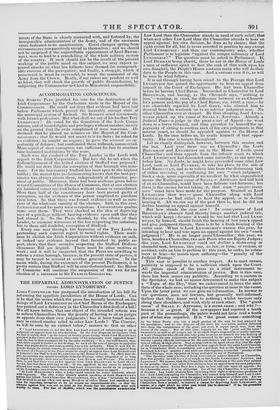ACCOMMODATING CONSCIENCES.
SIR ROBERT PEEL justified his vote for the destruction of the Irish Corporations by the disclosures made in the Report of the Commissioners. He could not deny that evidence had been laid before Parliament which proved the incurably corrupt state of the municipal system of Ireland. Sir ROBERT acted consistently with former professions. But what shall we say of his brother Tory LYNDHURST? He voted for the demolition of the Irish Corpo- rations, and of vested rights and privileges without number, merely on the ground that the evils complained of were notorious. He declared that he placed no reliance on the Report of the Com- missioners; that he would not resort to it for facts ; be asked for no evidence; he sought no inquiry ; he gave the accused no op- portunity of defence; but condemned them unheard, unconvicted. Mere report of their corruption was sufficient for him to overturn time-honoured institutions by the score. Such was the conduct of the Tory Leader in the Lords with regard to the Irish Corporations. But how did he act when the disfranchisement of the bribed electors of Stafford was proposed ? Ile could not deny that the corruption of that borough was noto- rious. For the last century Stafford has been open to the highest bidder ; the merest tyro in electioneering knows that the best pay- master was always secure there, independently of character, per- sonal or public. Moreover, there had been evidence given before several Committees of the House of Commons, that at one election six hundred voters received bribes without shame or concealment. More than half of the constituency have been proved guilty of corruption, on the evidence of the person employed to purchase their votes. So that there was formal evidence as well as noto- riety of the wholesale venality of the electors. Still, in this case, LYNDHURST and his party were scrupulous. Conscientious qualms came over them. They were shocked at the idea of depriving men of a privilege without hearing evidence upon oath that they had abused it. So the Peers decided, by the advice of their Leader, to examine witnesses at the bar respecting the notorious, but to them still doubtful, corruption of Stafford.
Every one sees through the hypocrisy of the Tory Lords in pretending such especial regard to vested rights. Their readi- ness to abolish the Irish Corporations without evidence on oath, or indeed any evidence beyond that furnished by public re- port, shows that their scruples respecting the Stafford Disfran- chisement Bill are feigned. There must be other motives at work ; and it will be suspected that the Peers arc unwilling to reform a rotten borough, because, in the present state of parties, it may be turned to account at another general election. In the mean while, during the existence of the present Parliament, it is pretty certain that Stafford will be semi-disfranchised : the House of Commons will continue the suspension of the writ for the election of a successor to Sir FRANCIS GOODRICKE.


























 Previous page
Previous page